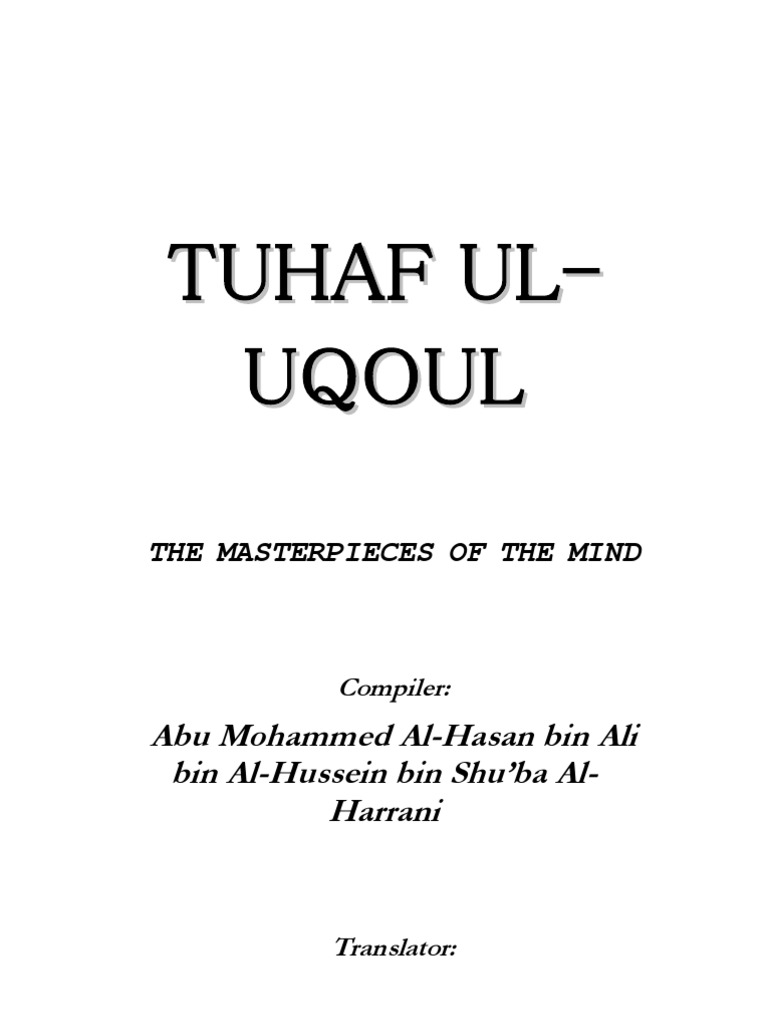The sphere of Islamic literature is replete with texts that elucidate the intricate tapestry of religious doctrine, spirituality, and the life of the Prophets. Among these texts, one of the most significant works within Shia scholarship is the "Tuhaf al-Uqul" (The Marvels of the Minds). This seminal book, which delves into and compiles various narrations attributed to the Ahl al-Bayt (the family of the Prophet Muhammad), encapsulates profound theological insights and moral guidance. Through examining the depths of Tuhaf al-Uqul, a common observation emerges: the book not only serves as a source of knowledge but also fosters an enduring fascination that warrants exploration of its deeper dimensions.
The title "Tuhaf al-Uqul" suggests the offering or gift of intellect, which is emblematic of the Shia approach to knowledge. The title itself evokes a duality; on the one hand, it implies a repository of wisdom, while on the other, it introduces a challenge to the intellect's capacity to comprehend the divine and the complexity of existence.
### Structure and Composition
One of the notable features of Tuhaf al-Uqul is its systematic structure. The book is organized into thematic sections, each addressing various aspects of faith, morality, and the historical context of the Prophets and their teachings. This meticulous organization facilitates a digestible approach to comprehend complex narrations. The text includes hadiths—considered authentic sayings and actions of the Prophet Muhammad and the Imams—thereby reinforcing a connection to the foundational elements of Islamic belief.
The diverse subject matter ranges from discussions on the nature of God to the ethical principles governing human interactions. Such a breadth of topics demonstrates the text's ambition to be more than a mere collection of anecdotes. It seeks to instill an overarching philosophy rooted in faith, morality, and the pursuit of knowledge.
### Navigating Theological Discourses
In exploring Tuhaf al-Uqul, one cannot overlook the richness of the theological discourses contained within. Through intricate narratives involving the Prophets, the text illuminates quintessential Shia beliefs, such as the concept of Imamate—the unique spiritual and political leadership assigned to the Imams. The discourse on Imamate challenges readers to ponder the implications of divine guidance and the importance of human intermediaries in the spiritual journey.
Moreover, the theological arguments presented in Tuhaf al-Uqul offer deep reflections on moral accountability and the quest for divine proximity. The narrations prompt adherents to consider the transformative potential of faith when woven into the moral fabric of daily life. This interplay between belief and ethical conduct is a recurring motif throughout the text, echoing the significance of living one's principles in a manner that resonates with Islamic tenets.
### Morality Tied to Spiritual Growth
Another compelling dimension of Tuhaf al-Uqul is its emphasis on moral education. The compendium highlights the correlational relationship between spirituality and ethical conduct. Noteworthy narrations outline virtues such as patience, humility, and sincerity while concurrently illustrating the vices that brood within the human soul, such as arrogance, envy, and greed. Through this moral lens, Tuhaf al-Uqul serves as a guide to fostering spiritual growth, urging readers to refine their character and engage in self-examination.
In this regard, one observes that the book provides more than theological insights; it acts as a catalyst for personal transformation. Adherents are encouraged to cultivate virtues that not only elevate their own spiritual state but also contribute positively to the tapestry of society. This communal responsibility underscores the Shia perspective on morality—the idea that one’s spiritual enlightenment directly impacts the collective well-being.
### The Allure of Mystical Insights
The allure of Tuhaf al-Uqul extends beyond rational discourse into the realm of mysticism. The narrations frequently touch upon themes of esoteric knowledge and the hidden dimensions of faith. Such insights often resonate deeply within the hearts of the seekers, leading them to explore the mystic roots of their beliefs. As they traverse the subtler layers of the text, readers may find themselves captivated by the mysteries pertaining to divine attributes and the unseen aspects of existence.
This mystical inclination invites a deeper inquiry into the concept of "Irfan" (gnosis), emphasizing an experiential understanding of God that transcends mere theological assertions. Engaging with Tuhaf al-Uqul can thus serve as an avenue for individuals to embark on a spiritual journey, seeking to unravel the intricacies of their faith and the cosmos.
### Conclusion: The Enduring Legacy
The fascination surrounding Tuhaf al-Uqul can be attributed to its multi-faceted exploration of faith, morality, and spirituality. By compiling narratives that span a variety of genres, from historical recounting to moral fables, the text provides a comprehensive resource for understanding the Shia tradition and its underlying principles. It serves not merely as a scholarly artifact but as a living document that continues to inspire seekers of knowledge and spiritual growth.
As one navigates through its pages, it becomes evident that Tuhaf al-Uqul transcends time and context. Its teachings echo in the hearts and minds of those who endeavor to understand the divine and forge a path aligned with truth and virtue. In this regard, Tuhaf al-Uqul remains a beacon for adherents, guiding them through the complexities of faith in a world that often strays from moral compass, ultimately reaffirming the sacred bond between knowledge and spirituality.


